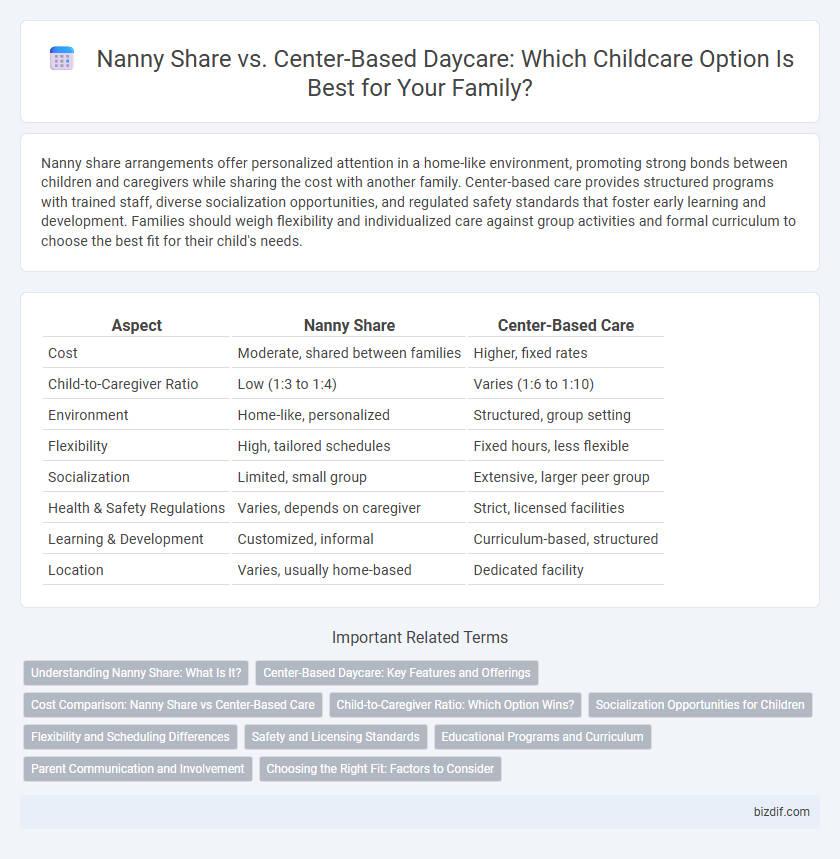Nanny share arrangements offer personalized attention in a home-like environment, promoting strong bonds between children and caregivers while sharing the cost with another family. Center-based care provides structured programs with trained staff, diverse socialization opportunities, and regulated safety standards that foster early learning and development. Families should weigh flexibility and individualized care against group activities and formal curriculum to choose the best fit for their child's needs.
Table of Comparison
| Aspect | Nanny Share | Center-Based Care |
|---|---|---|
| Cost | Moderate, shared between families | Higher, fixed rates |
| Child-to-Caregiver Ratio | Low (1:3 to 1:4) | Varies (1:6 to 1:10) |
| Environment | Home-like, personalized | Structured, group setting |
| Flexibility | High, tailored schedules | Fixed hours, less flexible |
| Socialization | Limited, small group | Extensive, larger peer group |
| Health & Safety Regulations | Varies, depends on caregiver | Strict, licensed facilities |
| Learning & Development | Customized, informal | Curriculum-based, structured |
| Location | Varies, usually home-based | Dedicated facility |
Understanding Nanny Share: What Is It?
Nanny share is a childcare arrangement where two or more families share one nanny, providing personalized care in a home setting while splitting the cost. This option offers tailored attention similar to in-home care but at a lower price than hiring a private nanny exclusively. Understanding nanny share helps parents evaluate if flexible schedules and individualized engagement meet their child's developmental needs compared to center-based care.
Center-Based Daycare: Key Features and Offerings
Center-based daycare provides structured learning environments with certified caregivers who follow accredited early childhood education curricula. Facilities typically include age-appropriate play areas, safety measures, and socialization opportunities that foster cognitive and emotional development. Families benefit from consistent hours, regulated health and safety standards, and access to specialized programs such as language immersion or STEM activities.
Cost Comparison: Nanny Share vs Center-Based Care
Nanny share arrangements often provide a more cost-effective solution compared to center-based care, as expenses are divided between participating families, reducing individual fees significantly. Center-based care typically charges a fixed rate per child, which can be higher due to facility maintenance, staff salaries, and regulated child-to-caregiver ratios. Families choosing nanny share benefit from personalized care and flexible hours at a lower overall cost, while center-based care offers structured programs and socialization opportunities but with potentially higher monthly expenses.
Child-to-Caregiver Ratio: Which Option Wins?
Nanny share arrangements typically offer a lower child-to-caregiver ratio, often providing more personalized attention and tailored care compared to center-based care, where ratios can be higher due to regulatory standards. Center-based care usually maintains ratios of one caregiver per four to eight children, depending on age group, ensuring professional oversight but less individualized focus. Families prioritizing close supervision and individualized interaction often prefer nanny shares, while those valuing structured socialization and licensed facilities might opt for center-based care.
Socialization Opportunities for Children
Nanny share arrangements offer personalized socialization by allowing children to interact closely with a small, consistent group, fostering deep peer bonds and individualized attention. Center-based care provides a wider range of social experiences through larger group settings, structured activities, and diverse age groups, promoting adaptability and broader social skills. Both options support social development but differ in peer interaction intensity and environment exposure.
Flexibility and Scheduling Differences
Nanny share arrangements offer greater flexibility in scheduling, allowing parents to customize care hours that align closely with their work routines and family needs. Center-based care typically operates on fixed hours and set calendars, which may limit adaptability but provides consistent, structured environments. Parents seeking personalized schedules often prefer nanny shares, while those valuing reliable and predictable timing lean towards center-based childcare.
Safety and Licensing Standards
Nanny share arrangements often lack the stringent safety protocols and licensing requirements mandated for center-based care, potentially increasing risk factors. Center-based daycare facilities comply with rigorous state regulations, including background checks, staff-to-child ratios, and safety inspections, ensuring a controlled environment. Licensing standards for centers guarantee consistent health and safety practices that may not be uniformly enforced in informal nanny share settings.
Educational Programs and Curriculum
Nanny share arrangements often provide personalized learning experiences tailored to each child's unique developmental needs, fostering creativity and individualized attention through flexible play-based activities. Center-based care typically follows a structured, research-backed curriculum that emphasizes early literacy, numeracy, and social skills within a group setting, promoting peer interaction and standardized learning milestones. Both models integrate educational programs designed to support cognitive growth, but center-based care offers broader access to specialized resources and certified educators.
Parent Communication and Involvement
Nanny share offers personalized communication and direct involvement with caregivers, enabling parents to tailor daily updates and engage closely in their child's routine. Center-based care provides structured communication through scheduled meetings and digital platforms, fostering a community environment where parents can participate in group activities and receive professional support. Both options prioritize consistent parent-caregiver interaction but differ in the intimacy and format of engagement.
Choosing the Right Fit: Factors to Consider
When choosing between nanny share and center-based care, prioritize factors such as cost, socialization opportunities, and individualized attention. Nanny shares often provide a more personalized environment with fewer children, while center-based care offers structured learning programs and peer interaction. Consider your child's temperament, your family's schedule, and the importance of proximity and flexibility to determine the best fit.
Nanny share vs Center-based care Infographic

 bizdif.com
bizdif.com